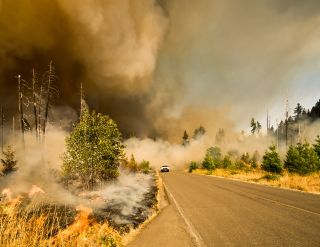Environment
The Effects of Wildfires on Mental Health
Unsurprisingly, wildfires have negative impacts on mental health.
Updated June 29, 2023 Reviewed by Gary Drevitch

Human health conditions are getting worse the more we prolong remedies for the planet’s changing climate. The wildfires in Canada spearheaded what have now been weeks of smog and poor air quality across the United States.
Unfortunately, this is not the first time that North America has seen the ill effects of wildfires on health, and notably, mental health. Considering many studies on wildfires studied the effects on mental health, a meta-analysis took a look at what those studies concluded.
While most of the studies occurred in nations like Australia, Canada, and the United States, 21 of the studies – 58.33 percent of the studies considered – focused on the effects of wildfires and their pollutants on mental health, while the others focused on physical health.
Unsurprisingly, all of the studies found that the effects of wildfires had negative impacts on mental health. Significant associations were found between wildfire exposure and anger issues, posttraumatic stress disorder, specific phobia, severe psychological distress, and heavy drinking (Gao et al., 2023).
One study even found that 10 years after the occurrence of a wildfire, 22 percent of the surrounding region had a higher risk of mental-health problems and an increased risk for heavy drinking (Gao et al., 2023).
In a sample of 9,376 survey responses from adolescents ages 11 to 19 who lived in the region near the 2016 Fort Murray Wildfire, all symptoms related to measures of mental illness increased from 2017 to 2019. This included measures for posttraumatic stress disorder, depression, anxiety, drug use, quality of life, self-esteem, and resilience (Brown et al., 2021). Only scores of resilience remained unchanged over the 3.5-year follow-up. This failed to support the hypothesis of the researchers who believed that mental-health measures would improve in years after the occurrence of wildfires.
Even though the majority of the studies focus on developing nations, the rise in global temperatures and subsequent fires can result in damages to agriculture and heat stress, which have negative impacts to such nations’ economy and quality of living, especially if citizens do not have access to air conditioning (Sun et al., 2023).
Awareness of the ill effects of climate change is important to consider when formulating policies that guide global efforts to mitigate the costs and damage resulting from environmental hazards. No longer can we deny the numbers; the proof is in the data.
References
Bosman, Julie. (2023). “Smoky skies menace U.S. cities, driving residents indoors.” New York Times. https://www.nytimes.com/2023/06/28/us/canada-wildfire-smoke-air-quality-midwest.html
Gao, Y., Huang, W., Yu, P., Xu, R., Yang, Z., Gasevic, D., ... & Li, S. (2023). Long-term impacts of non-occupational wildfire exposure on human health: A systematic review. Environmental Pollution, 121041.
Brown, M. R., Pazderka, H., Agyapong, V. I., Greenshaw, A. J., Cribben, I., Brett-MacLean, P., ... & Silverstone, P. H. (2021). Mental health symptoms unexpectedly increased in students aged 11–19 years during the 3.5 years after the 2016 Fort McMurray wildfire: Findings from 9,376 survey responses. Frontiers in Psychiatry, 12, 676256.
Sun, Q., Miao, C., Hanel, M., Borthwick, A. G., Duan, Q., Ji, D., & Li, H. (2019). Global heat stress on health, wildfires, and agricultural crops under different levels of climate warming. Environment international, 128, 125-136.


